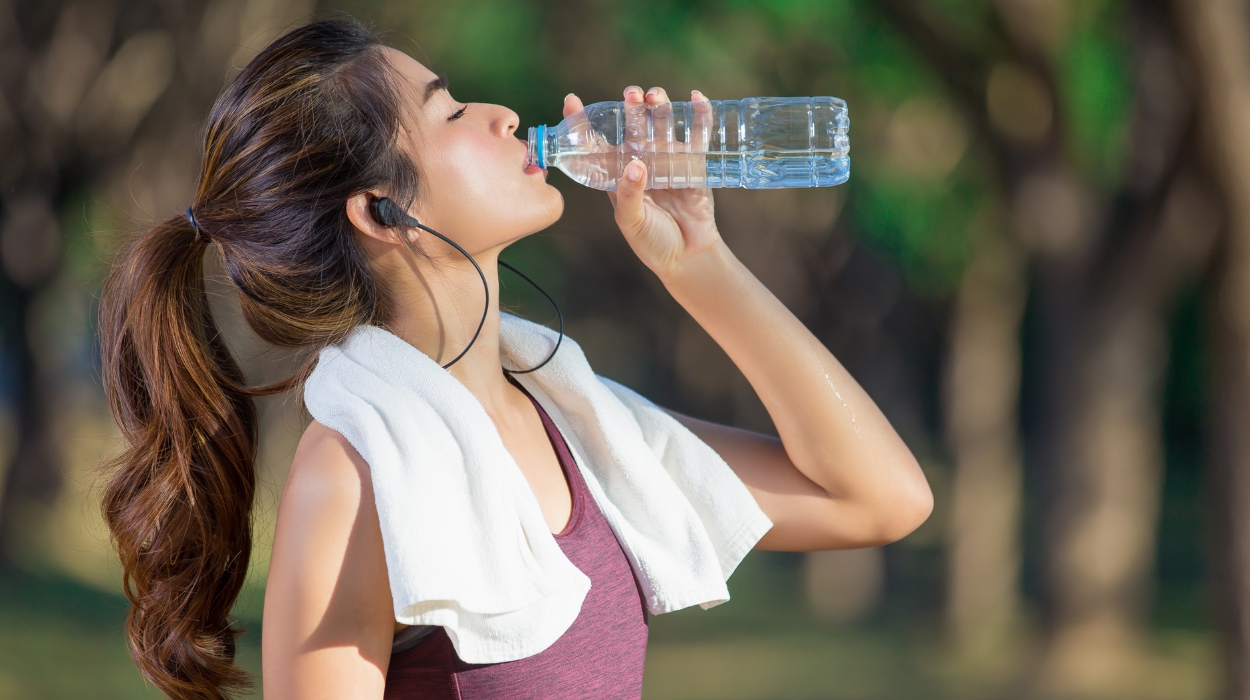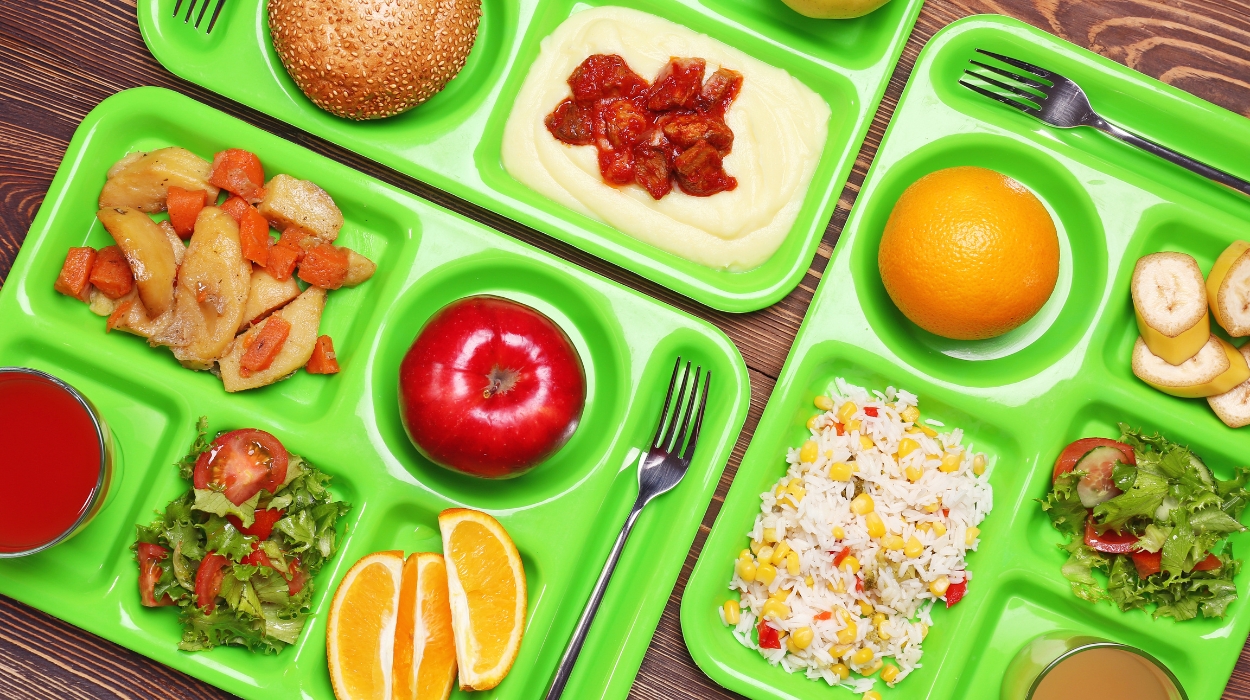 Expert's opinion
Expert's opinion
Expert's opinion
The article is a subjective view on this topic written by writers specializing in medical writing.
It may reflect on a personal journey surrounding struggles with an illness or medical condition, involve product comparisons, diet considerations, or other health-related opinions.
Although the view is entirely that of the writer, it is based on academic experiences and scientific research they have conducted; it is fact-checked by a team of degreed medical experts, and validated by sources attached to the article.
The numbers in parenthesis (1,2,3) will take you to clickable links to related scientific papers.
How To Lose Weight In College: 13 Healthy Tips To Follow 2024

Many college students tend to gain loads of weight in their first year. However, experiencing undesirable weight gain doesn’t have to be your reality. Instead, use some healthy hacks for your healthy weight management. Boost your weight loss efforts by getting enough restful sleep each night, staying hydrated, using a fat burner, and eating healthy foods. You want to focus on developing yourself and your studies at college, not agonizing over the scale.
How To Lose Weight In College
College students can end up gaining unwanted weight if not careful. Handling high stress, turning to fad diets, changing sleep and eating habits, and managing new responsibilities can cause weight gain. Check out these 13 healthy hacks to stay in shape:
- Avoid Binge Drinking
- Snack Smart
- Keep A Food Journal
- Drink Plenty Of Water
- Get Enough Sleep
- Make Sure To Eat Breakfast
- Stay Physically Active
- Don’t Eat Late At Night
- Find Emotional Support
- Stick To The Serving Size
- Don’t Depend On Fast Food Or Vending Machines
- Take The Stairs
- Manage Your Stress Levels
13 Healthy Hacks On How To Lose Weight In College
Don’t panic about your college weight gain and run to fad diets; come up with creative ways to punish yourself or skip eating sporadically to trick your metabolism. Instead, the following healthy hacks can help you lose weight, take charge of your overall health, and develop habits to succeed.
Avoid Binge Drinking
Alcohol and college life may seem to go hand-in-hand via movies and television shows. However, binge drinking poses many health dangers beyond gaining weight[1] and becoming obese. Large amounts of alcohol consumption can contribute to a beer belly, lead to physiological dependence, lowered cognitive function,[2] and poor sleep.[3]
Instead of reaching for a beer or hard liquor to be social, opt for non-alcoholic beverages, water, or simply limit your alcohol intake. Your health and the scale will thank you.
Snack Smart
Whether you are pulling an all-nighter, feel pressed for time, or discover the cafeteria was closed when you wanted to eat, choose healthy snacks. The desire to snack on late-night munchies is a common phenomenon for college students, primarily because of skipping meals, difficulty cooking for themselves, or the desire to experience a rewarding rush of serotonin.
When possible, choose healthier options like nutrient-rich foods that are high in fiber and protein to stay full. Reach for healthy snacks[4] like Greek yogurt, peanut butter, fresh fruit and veggies, whole grain cereals, and drink plenty of water to feel fuller longer. Snacking often on junk foods, fast foods, and foods high in sugar, salt, and fat can quickly pack on the pounds.
Keep A Food Journal
Hold yourself accountable for what you put on your plate and in your body by keeping a food journal.[5] It can be difficult to adjust from eating home-cooked meals to relying on the campus cafeteria, fast food, microwave dinners, or snacking on processed foods to feel satiated.
If you develop the stomach flu, a food allergy, or wonder why you suddenly started gaining weight, you can refer back to your food journal. Writing down what you eat, how much, and what time of day can help you better understand the patterns you are creating and what needs changing.
Drink Plenty Of Water

Keep a water bottle close throughout your day, and make sure to drink water[6] often. Sometimes, being dehydrated is mistaken for hunger pangs or leads to snacking for comfort. Before you reach for cheap food or fast food with empty calories or gorge yourself on cafeteria or dining hall goodies, make sure you drink some water first.
If you can, try to drink water first thing after waking up and right before going to bed to keep hydrated.
Get Enough Sleep
Not getting enough sleep can lead to poor focus, fuzzy memory, irritability, and weight gain. For many students, skipping out on sleep is seen as necessary to cram for exams, finish time-consuming assignments, or socialize.
Push any fear of missing out to the side and prioritize getting enough sleep to improve your health and keep weight gain at bay. Getting less than the recommended hours of sleep can stress the immune system and gut microbiome,[7] leading to getting sick more quickly and more often.
Adults who don’t get enough sleep are more at risk for developing a metabolic syndrome disorder, often make poor dietary choices, overeat, are sedentary, and balloon in body weight.
Make Sure To Eat Breakfast
It can be tempting to skip breakfast, especially if you are constantly waking up late to your first class of the day. However, make an effort to eat breakfast to curb overeating, and cravings for junk food, and to lose college weight. Typically, many adults skip breakfast[8] or eat very little, saving the most calorie-heavy meals for right before bed at dinner.
Choose healthy breakfast foods high in fiber and protein to feel full and reduce the desire to snack on unhealthy foods. Practice portion control and make breakfast something to look forward to and enjoy. Make sure to eat a variety of nutrient-dense foods to nourish your mind and body.
Stay Physically Active
College can be emotionally and mentally exhausting, triggering many students to find an outlet to relax and get away from it all. It becomes tempting to spend increasing time in your dorm room binge-watching your favorite shows, playing video games, or scrolling endlessly on social media.
Being sedentary[9] in college is a quick way to let things fall apart as your waistline expands. Make time to get moving and get outside, hit the gym, or find ways to stay physically active a few days out of the week. Working out regularly or being committed to physical activity helps boost morale, raises serotonin levels, and helps with losing weight.
Don’t Eat Late At Night
When pulling an all-nighter, it’s easy to find yourself grabbing unhealthy food options from vending machines or the local fast food[10] joint. But, college students soon find themselves paying for this mistake faster than student loans, in unwanted weight gain.
Eating food late now and then won’t set your ideal healthy body weight goals back too severely. However, late eating habits cause poor sleep quality, increased irritability, higher stress levels, and poor cognitive functioning the following day. Late-night eating and snacking contribute significantly to an unbalanced circadian rhythm[11] and throw off the gut microbiome.
Being stressed out, suffering from poor digestion, and fuzzy thinking can increase the risk of becoming overweight, obese, or developing metabolic syndrome disorders. Don’t eat late when you should be sleeping instead!
Find Emotional Support
If you can, find a friend with similar weight loss and health goals to help you stay accountable to your health and offer emotional support[12] as needed. If you feel it is best, seek out counseling services on campus if you find yourself eating in response to stress, have an eating disorder, or need someone to talk to about anything.
Embrace the fullness of college life and everything it offers, but also celebrate your small wins and be patient with yourself. If you find yourself rapidly gaining weight, sleeping poorly, making poor dietary decisions, or becoming physically inactive and withdrawn, seek emotional support.
Stick To The Serving Size

Avoid the desire to fill up your college cafeteria or dining hall tray as high as possible. It is easy to gain weight if your student meal plan only allows you to take what you can fit on your tray, promoting food waste and overeating.[13]
A good rule to follow is to eat only a handful or two of certain foods and give yourself time to see if you still feel hungry. Also, don’t eat directly out of any bags and boxes of packaged foods, and stick to the suggested serving size. Reduce overeating and consequent unwanted weight gain by eating for one.
Don’t Depend On Fast Food Or Vending Machines
Fast food and vending machines may satisfy your desire for convenience, but they can rob you of sustained energy levels and leave you feeling hungry later. It’s easy to gain weight[14] when your diet consists primarily of fast food or products from vending machines with high fat, salt, and sugar levels. Prioritize your time to eat healthy meals and healthy snacks to stay fueled.
Take The Stairs
If a campus or student housing has elevators or escalators, don’t pass up any opportunity to use those stairs to stay fit and lose weight in a short span of time. You can enjoy a quick workout, blast away stubborn belly fat, and improve your mood by taking the stairs.
Manage Your Stress Levels
Going to college can be a stressful experience. For many students, it is their first time being held accountable for everything in their life, from completing assignments on time to making sure to get enough sleep and eat healthily. It takes time to navigate the demands of college life.
Avoid emotional eating, sleeping excessively, abusing substances, or putting off responsibilities to cope with high-stress levels. Constantly feeling stressed can cause weight gain[15] because of elevated cortisol and negative responses. If needed, find a source of emotional support and choose healthy outlets to stress like deep breathing, positive visualization, meditation, and exercise.
How Does Weight Gain Happen To College Students?
The human body is sensitive to lifestyle changes, stress, diet, and sleeping patterns. For many students, attending a college or university involves living on your own as a young adult for the first time. As college students learn how to cope with a new environment, being accountable for showing up to class, completing assignments, and finding time for a social life, weight gain often follows.
Many college campuses feature cafeterias where students are welcome to fill up their trays. At college, students may be unprepared to practice portion control or make smart dietary decisions. Often, eating too much or poorly is a response to stress, a desire for comfort, an emotional coping mechanism, or to make up for skipping meals.
Some students feel immense pressure to do well in college from well-meaning friends and family. When college student lives independently, it can be incredibly challenging navigating peer pressure, their studies, and other demands.
The fabled “Freshman 15” doesn’t only show itself in female college students.[16] Adults of all genders going to college can experience unwanted weight gain.[17]
Precautions
Going to college is an experience many young people look forward to as they come into adulthood and are recognized for their independence. However, it can be challenging to learn how to deal with one’s body image, time management, stress, and making time to eat healthily.
Before you radically change your diet or lifestyle, consult a trusted, certified healthcare professional. If you have any pre-existing health conditions, are taking any medications, or have any physical or mental health concerns, making any significant changes can have a considerable impact.
Utilizing healthy hacks to support weight loss or healthy weight maintenance in college may also improve your academic life, mental well-being, physical health, and appearance. Choose to invest in your health and develop your best self to get the most out of your college experience.
+ 17 sources
Health Canal avoids using tertiary references. We have strict sourcing guidelines and rely on peer-reviewed studies, academic researches from medical associations and institutions. To ensure the accuracy of articles in Health Canal, you can read more about the editorial process here
- Journal of American College Health. (2023). Binge Drinking in Female College Students: The Association of Physical Activity, Weight Concern, and Depressive Symptoms. [online] Available at: https://www.tandfonline.com/doi/abs/10.3200/JACH.53.3.133-140.
- Hartley, D.M., Elsabagh, S. and File, S.E. (2004). Binge drinking and sex: effects on mood and cognitive function in healthy young volunteers. [online] 78(3), pp.611–619. doi:https://doi.org/10.1016/j.pbb.2004.04.027.
- Popovici, I. and French, M.T. (2013). Binge drinking and sleep problems among young adults. [online] 132(1-2), pp.207–215. doi:https://doi.org/10.1016/j.drugalcdep.2013.02.001.
- Valentine Yanchou Njike, Smith, T.M., Omree Shuval, Kerem Shuval, Edshteyn, I., Kalantari, V. and Yaroch, A.L. (2016). Snack Food, Satiety, and Weight. [online] 7(5), pp.866–878. doi:https://doi.org/10.3945/an.115.009340.
- Ortega, R.M., Pérez-Rodrigo, C. and López-Sobaler, A.M. (2015). Dietary assessment methods: dietary records. [online] 31 Suppl 3, pp.38–45. doi:https://doi.org/10.3305/nh.2015.31.sup3.8749.
- Stookey, J.D. (2010). Drinking Water and Weight Management. [online] 45(6), pp.S7–S12. doi:https://doi.org/10.1097/nt.0b013e3181fe15a8.
- Ezgi Bellikci Koyu, B.P. Sarer-Yurekli, Yakut Akyön, Ahmet Gokhan Ozgen, Brinkmann, A.O., Nitsche, A., Koray Ergünay, Yilmaz, E., Marie-Pierre St-Onge and Zehra Buyuktuncer (2021). Associations of sleep quality and night eating behaviour with gut microbiome composition in adults with metabolic syndrome. [online] doi:https://doi.org/10.1017/s0029665121000707.
- Jakubowicz, D., Barnea, M., Wainstein, J. and Froy, O. (2013). High Caloric intake at breakfast vs. dinner differentially influences weight loss of overweight and obese women. [online] 21(12), pp.2504–2512. doi:https://doi.org/10.1002/oby.20460.
- Manson, J.E., Skerrett, P.J., Greenland, P. and VanItallie, T.B. (2004). The Escalating Pandemics of Obesity and Sedentary Lifestyle. [online] 164(3), pp.249–249. doi:https://doi.org/10.1001/archinte.164.3.249.
- Kruger, D.J., Greenberg, E., Murphy, J.B., DiFazio, L.A. and Youra, K.R. (2014). Local Concentration of Fast-Food Outlets is Associated with Poor Nutrition and Obesity. [online] 28(5), pp.340–343. doi:https://doi.org/10.4278/ajhp.111201-quan-437.
- Versteeg, R.I., Serlie, M.J., Kalsbeek, A. and Susanne (2015). Serotonin, a possible intermediate between disturbed circadian rhythms and metabolic disease. [online] 301, pp.155–167. doi:https://doi.org/10.1016/j.neuroscience.2015.05.067.
- Strine, T.W., Chapman, D.P., Balluz, L.S. and Mokdad, A.H. (2008). Health-related quality of life and health behaviors by social and emotional support. [online] 43(2), pp.151–159. doi:https://doi.org/10.1007/s00127-007-0277-x.
- Stunkard, A.J. and Allison, K.C. (2003). Two forms of disordered eating in obesity: binge eating and night eating. [online] 27(1), pp.1–12. doi:https://doi.org/10.1038/sj.ijo.0802186.
- Rosenheck, R.A. (2008). Fast food consumption and increased caloric intake: a systematic review of a trajectory towards weight gain and obesity risk. [online] 9(6), pp.535–547. doi:https://doi.org/10.1111/j.1467-789x.2008.00477.x.
- Hewagalamulage, S.D., T. Randall Lee, Clarke, I.J. and Henry, B.A. (2016). Stress, cortisol, and obesity: a role for cortisol responsiveness in identifying individuals prone to obesity. [online] 56, pp.S112–S120. doi:https://doi.org/10.1016/j.domaniend.2016.03.004.
- Journal of American College Health. (2014). The Freshman 15—A Closer Look. [online] Available at: https://www.tandfonline.com/doi/abs/10.1080/07448480903295334.
- Cluskey, M. and Grobe, D. (2009). College Weight Gain and Behavior Transitions: Male and Female Differences. [online] 109(2), pp.325–329. doi:https://doi.org/10.1016/j.jada.2008.10.045.



